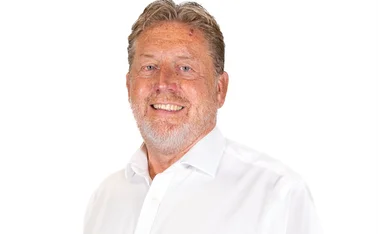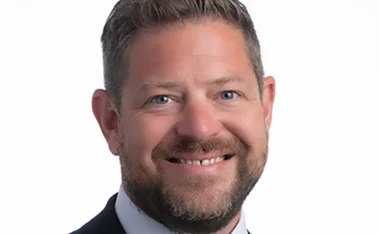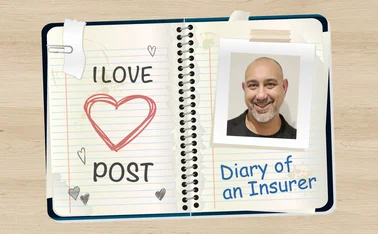
Interview: Colm Holmes, Aviva

Need to know
- The role of CEO is a new one for Holmes
- Tulloch is still very much involved in the business as chairman of GI
Six months into the job, Aviva UK’s newly appointed GI CEO talks to Martin Croucher about the challenges of succeeding Maurice Tulloch and further investment into digital
The role of CEO of Aviva UK’s general insurance business has been viewed as a revolving door for some time. Colm Holmes is the eighth person to be appointed to the job in the past 15 years, succeeding Maurice Tulloch in March.
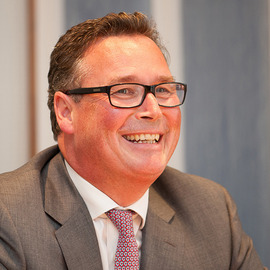 But the prospect doesn’t appear to bother Holmes, who believes the organisation is greater than the sum of its parts. “We’re all just managing this for a very short time,” he said. “It’s an organisation that’s been around for many hundreds of years.
But the prospect doesn’t appear to bother Holmes, who believes the organisation is greater than the sum of its parts. “We’re all just managing this for a very short time,” he said. “It’s an organisation that’s been around for many hundreds of years.
“My stint is no different from Mark Wilson’s [global CEO] stint, which [will be about] how we can create legacy and leave Aviva in a better place than where we found it.”
Holmes was hired around the same time as Tulloch moved to the UK from his Aviva Canada role, joining as chief financial officer in 2013 from a group treasurer role at Zurich. In the past three years, he has worked closely with Tulloch on the business. When his appointment was announced in January, it was widely welcomed by brokers.
Part of the reason for the appointment, Holmes admits, is because he was viewed as a safe pair of hands.
“While I’m new from Maurice, what you have got is absolute continuity,” he adds. “Maurice and I have worked very closely together. I arrived around the same time as he did.
“We still work very closely on the future of the business. We have a shared view as to directionally where the GI business wants to go. While the individual has changed, it’s still the same strategy that we’re continuing on.
“That continuity was very important in the decision over who would take the role once Maurice moves up to a more global perspective.”
That is in contrast to a Post interview in 2015 with Tulloch, who said: “I am not here to guide this great company; I’m here to change it.”
However, Holmes doesn’t shy away from praising Tulloch’s legacy. “Maurice has left an incredible mark on the business,” he says. “From when we arrived, to where we are now, the business has gone through significant transformation.
“We exited a lot of businesses that weren’t profitable. We’ve seen a lot of change in the management team. We’ve seen growth last year.”
He points to deals between Aviva and Homeserve, TSB and Carphone Warehouse as also part of Tulloch’s legacy. “These are significant changes. Not only in growth terms, but in the types of business we’re now writing and the types of relationships we’re now building. We’re at the start of that journey.”
Working closely
Tulloch has moved to global GI CEO but Holmes says he still works closely with him: “Maurice is still involved in important areas like Climate Wise and the Association of British Insurers, and we still work very closely on the future of the business.”
Tulloch was a well-known face, sitting on the boards of Flood Re as well as both of the above organisations. Even before he started in the role, in 2013, brokers said he was liked “tremendously” in the market. That reputation only grew during his tenure.
Will Holmes take over those roles, particularly on boards of industry bodies? “No,” he says. “Well, yes and no. Right now what I need to focus on is the business and actually delivering the results we’re capable of delivering.
“While we’ve had excellent performance over the last couple of years, and turned around the business, there’s much more to come. Maurice is very passionate about a lot of those subjects. It’s important we have continuity in some of them.
“We’ll chop and change no doubt, but Maurice will still be actively involved. I’m delighted he will be, he’s a hugely talented individual. This is not about personalities; it’s about Aviva and doing the right thing for our customers and growing our business.”
Holmes comes from a finance background, starting his career with Grant Thornton and later becoming vice-president of JP Morgan. He moved to Zurich and continued with a string of financial roles.
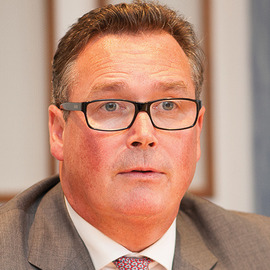 He admits the role of CEO is new to him. “There are always challenges in a new role,” he says. “In terms of my background, when I was at JP Morgan the bulk of my time was about managing profit and loss not in the finance areas. In Zurich, most of my work was in managing businesses. The bulk of my experience has been in business development and business management, albeit with a very heavy finance bent. My last years at Zurich, and my first years, were in finance.”
He admits the role of CEO is new to him. “There are always challenges in a new role,” he says. “In terms of my background, when I was at JP Morgan the bulk of my time was about managing profit and loss not in the finance areas. In Zurich, most of my work was in managing businesses. The bulk of my experience has been in business development and business management, albeit with a very heavy finance bent. My last years at Zurich, and my first years, were in finance.”
He adds: “I really enjoyed the role of CFO. The role of CEO is a very different role. But I would argue increasingly CEOs and CFOs are much tighter teams in managing businesses, compared to the old days.
“It is less about debits and credits and more about finance support, and forward-looking strategic thinking. I’ve managed strategy as CFO, a lot of this is a continuous build on. Externally, the role does change. That’s the biggest change.”
Developing relationships
In particular, developing and building relationships with brokers will still be an important aspect of the job for Holmes. “I spend a lot more time with customers and the broker community,” he says. “That’s something I enjoy.
“While it is something different, it is ‘enjoyable different’. We’ve built some really strong relationships through our broker community, I had met most of them in my prior role, but building on those relationships has been very easy.”
However, with further investment in digital, will the company move more toward an increasingly direct model? “We have made it clear that we’re digital first in everything we do,” he says. “Digital is not necessarily direct. Digital is across our distribution channels, our strategic partners, our bank assurance partners, broker partners and our direct business.
“We’ve seen that our direct model can offer significant discounts to our customers and the vast bulk of the growth that we’ve seen on the personal lines business has been on the direct space. We have shrunk our footprint in the broker personal lines space. We focus on profitability, it’s a very simple view that we take.”
He adds: “If a customer chooses to come through a broker or come direct to us, we’re looking at what margin we need to generate on our business. To the extent that it is profitable, we will stay in those channels. To the extent that it is not, we will never chase premium. That’s not a target we have. Our target is underwriting profit.
“The broker channel will remain, because there are a significant number of customers that have niche products, or specialist products, or have a larger insurance need, and they want the service of a broker.”
Later, he underlines the important role brokers play. “They’re one of the most innovative groups of people in the insurance industry,” he says. “Aviva will continue to partner and we’ll continue to digitise the broker relationship with them.”
Holmes says the company will invest “a significant amount” over the coming years in digital, primarily in making the service more customer-friendly.
“It’s the primary investment that we as an organisation will make,” he says. “There’s a huge amount of work going on about simplifying our propositions.
“It’s not just a mobile phone app. The mobile phone app is an entry into what is effectively a changed Aviva. It provides absolute transparency about what your premium is made up of, where that premium goes, and what it covers.
“This is about building relationships with our customers, building a lifetime relationship, rather than just the kind of transactional relationship that has typified insurance in the past. Customers want a digital service, they don’t want the old-fashioned large envelopes with 300 pages of complicated insurance wording.”
The word customer is used repeatedly during the interview. Building the experience around the customer has been one of the guiding planks at Aviva and many other composites over the past few years, and it is a strategy that former Aviva personal lines boss Steve Treloar has taken with him to rival LV.
Aviva appointed Adam Kornick in 2014 as global analytics head, and he now heads a department that is proving crucial to the future of the business. Not only does analytics increase the cross-sell opportunity, it means lower premiums for customers, Holmes says.
“Our composite offerings allow us to make fairly significant discounts for our customers, based off data analytics that we have created,” he says. “Actually for the customer they can see a lower premium, but for us the margin on the business increases. We are passing on those savings to customers that we get out of mining those analytics.”
Net written premiums climbed from £1.85bn to £2bn in the 2016 H1 results as the insurer benefited from its five-year partnership with Homeserve. At the time, Holmes referred to it as a “good bad deal” as it also raised combined operating ratio by 1%.
Homeserve previously had a deal with Axa that was worth around £300m in gross written premiums. Holmes says the numbers are the same for Aviva. “That’s a starting point,” he says.
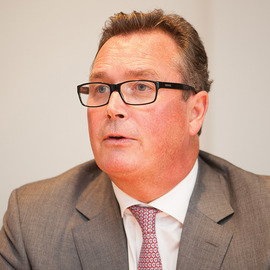 “It’s a hugely important transaction for Aviva. The work we’re doing with Homeserve around prevention is a game-changer in how we operate and how we manage prevention.
“It’s a hugely important transaction for Aviva. The work we’re doing with Homeserve around prevention is a game-changer in how we operate and how we manage prevention.
“Homeserve has a capability that doesn’t exist currently with Aviva. We can now replace fridge freezers or washing machines that break within 24 hours, delivered and plumbed in. In the coming months we’ll be launching some new capabilities in that area that we’ll be publicising.
“As a composite insurer, we have a unique opportunity of providing a one-stop-shop to customers that other insurers just can’t do.”
Pioneering technology
A lot of the technologies the company is pioneering, like leak detection technology Leakbot, and home protection system Cocoon, are there to prevent claims from occurring in the first instance. Holmes says that would continue to be a focus with the Homeserve tie-up.
“We’ve got a lot of investment and a team working on prevention,” he adds. “Most customers would tell you they’d rather not be flooded than have their insurer fix the problem afterwards. Replacing personal effects is very difficult.
“We are doing whatever we can to cut out a lot of these hazards and prevent fires, floods and leaks from even taking place.”
On a national level, Aviva is pushing for another form of prevention in the form of flood defences. The company is sending a public affairs delegation to the Conservative Party Conference to address the issue.
“There’s no doubt in our mind that the solution to this is preventing flooding, not fixing it after it’s already happened,” he says.
Another area the company is participating in is the consultation over driverless cars.
Despite the obvious threats to motor insurance, Holmes remains positive.
“We were in insurance when people were using a horse and cart,” he says. “The change in technology is as much of an opportunity as it is a challenge.”
Only users who have a paid subscription or are part of a corporate subscription are able to print or copy content.
To access these options, along with all other subscription benefits, please contact info@postonline.co.uk or view our subscription options here: https://subscriptions.postonline.co.uk/subscribe
You are currently unable to print this content. Please contact info@postonline.co.uk to find out more.
You are currently unable to copy this content. Please contact info@postonline.co.uk to find out more.
Copyright Infopro Digital Limited. All rights reserved.
As outlined in our terms and conditions, https://www.infopro-digital.com/terms-and-conditions/subscriptions/ (point 2.4), printing is limited to a single copy.
If you would like to purchase additional rights please email info@postonline.co.uk
Copyright Infopro Digital Limited. All rights reserved.
You may share this content using our article tools. As outlined in our terms and conditions, https://www.infopro-digital.com/terms-and-conditions/subscriptions/ (clause 2.4), an Authorised User may only make one copy of the materials for their own personal use. You must also comply with the restrictions in clause 2.5.
If you would like to purchase additional rights please email info@postonline.co.uk



